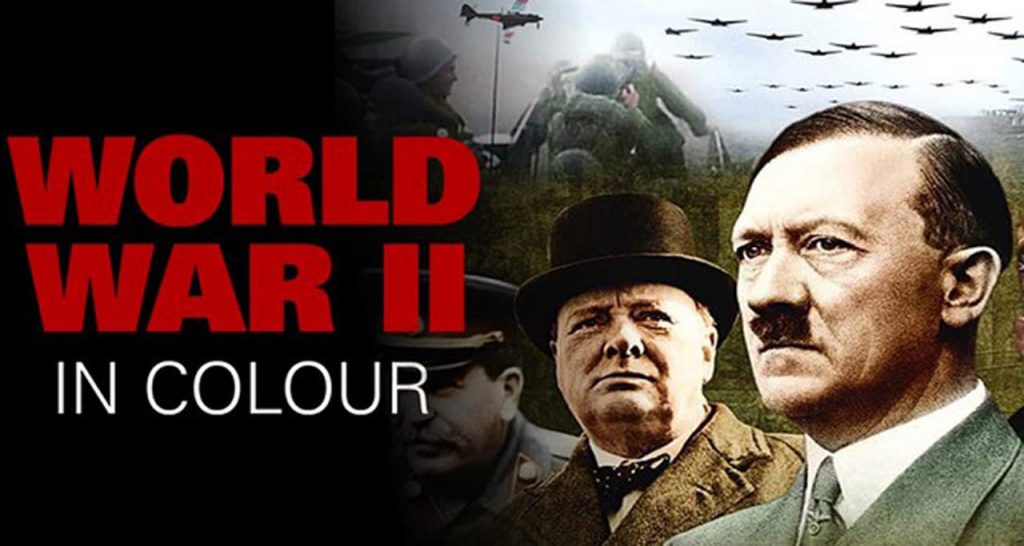World War II In HD Colour episode 6: Mussolini’s ambition had always been to recreate the old Roman empire. The trouble was, militarily, he was a disaster. After failed attacks in North Africa and Greece, his armies were on the run. Hitler, now faced a difficult choice. Did he divert troops needed at other fronts to support his ally, or did he let Mussolini fall ? Hitler chose to support him – a decision that would spell disaster for both of them. Hitler would lose hundreds of thousands of troops. Mussolini would be assassinated.
This film tells the extraordinary story of the war in North Africa and features the heroics of the tiny island of Malta as it withstood wave after wave of Nazi assault. It ends with the Allies fighting their way up Italy and Germany in retreat. World War II in Colour is a 13-episode British television docuseries recounting the major events of World War II narrated by Robert Powell. It was first broadcast in 2008–2009. The series is in full colour, combining both original and colourized footage. The show covers the Western Front, Eastern Front, North African Campaign and the Pacific War. It was on syndication in the United States on the Military Channel.
World War II In HD Colour episode 6
North African campaign
The North African campaign of the Second World War, also known as the Desert War, was a series of battles and engagements that took place in North Africa from June 1940 to May 1943. The campaign was fought between the Allied powers, led by the British Commonwealth and exiles from German-occupied Europe, and the Axis powers. The United States officially entered the war in December 1941 and began direct military assistance in North Africa on May 1942.
The campaign began with the Italian declaration of war on June 10, 1940. On June 14, the British Army’s 11th Hussars, assisted by elements of the 1st Royal Tank Regiment, crossed the border from Egypt into Libya and captured the Italian Fort Capuzzo. This was followed by an Italian counter-offensive into Egypt, which resulted in the capture of Sidi Barrani in September. However, the British Commonwealth launched a counteroffensive, known as Operation Compass, in December 1940, which resulted in the recapture of Sidi Barrani and the destruction of the Italian 10th Army.
In February 1941, as part of Operation Sonnenblume, German Afrika Korps, commanded by Erwin Rommel, also known as “The Desert Fox,” was dispatched to North Africa to reinforce Italian forces and prevent a complete Axis defeat. Rommel’s arrival in North Africa marked the beginning of a series of intense and fluid battles, as the Axis powers struggled to gain control of the vast desert terrain. The campaign was characterized by a series of battles fought in the Libyan and Egyptian deserts, as well as in Morocco and Algeria.
Benito Mussolini
Mussolini’s ambition was a driving force throughout his political career and played a significant role in the events of the 20th century. Benito Mussolini, also known as Il Duce, was the fascist dictator of Italy from 1922 to 1943. He came to power through a combination of charisma, political cunning, and manipulation of the press. Mussolini’s ambition was to create a new Roman Empire, with Italy as its center. He sought to expand Italy’s territory and influence through territorial conquest and military aggression. He sought to create a totalitarian regime in which the state controlled all aspects of society, including the economy, culture, and the media. He also sought to create a cult of personality around himself as the leader of the nation.
Mussolini’s ambition led to Italy’s involvement in the Second World War, with the goal of creating a new empire in Africa and the Mediterranean. He believed that Italy could become a dominant power in Europe and the world through military conquest. He also believed that fascism was the only ideology that could create a new era of prosperity and power for Italy.
Mussolini’s ambition ultimately proved to be his downfall. His aggressive foreign policy, coupled with the country’s economic and military weaknesses, led to Italy’s defeat in the war. His alliance with Nazi Germany also led to the country’s occupation by the Allies. His regime was subsequently overthrown, and he was executed by Italian partisans in April 1945.
In conclusion, Mussolini’s ambition was a driving force throughout his political career and played a significant role in the events of the 20th century. His desire to create a new Roman empire through territorial conquest and military aggression ultimately led to Italy’s defeat in the Second World War and the downfall of his regime. Despite this, his ideas and methods continue to be studied and debated by historians and political scientists, as a cautionary tale of the dangers of authoritarianism and the consequences of unchecked ambition.




